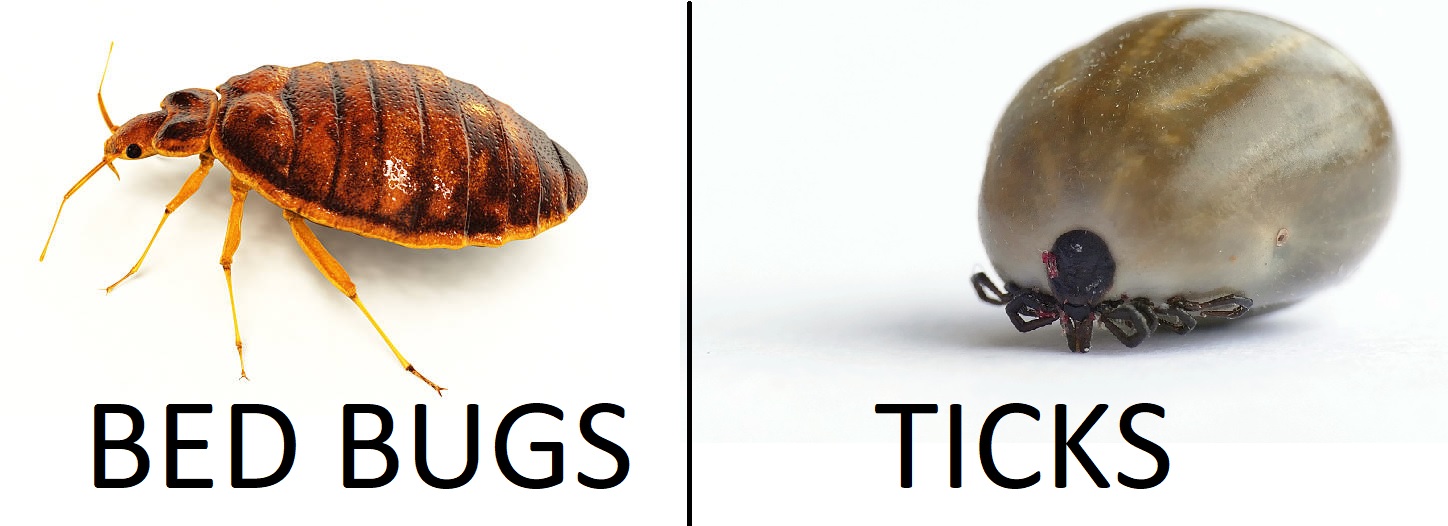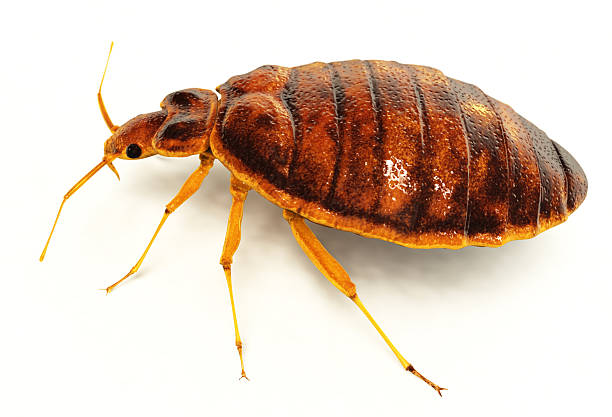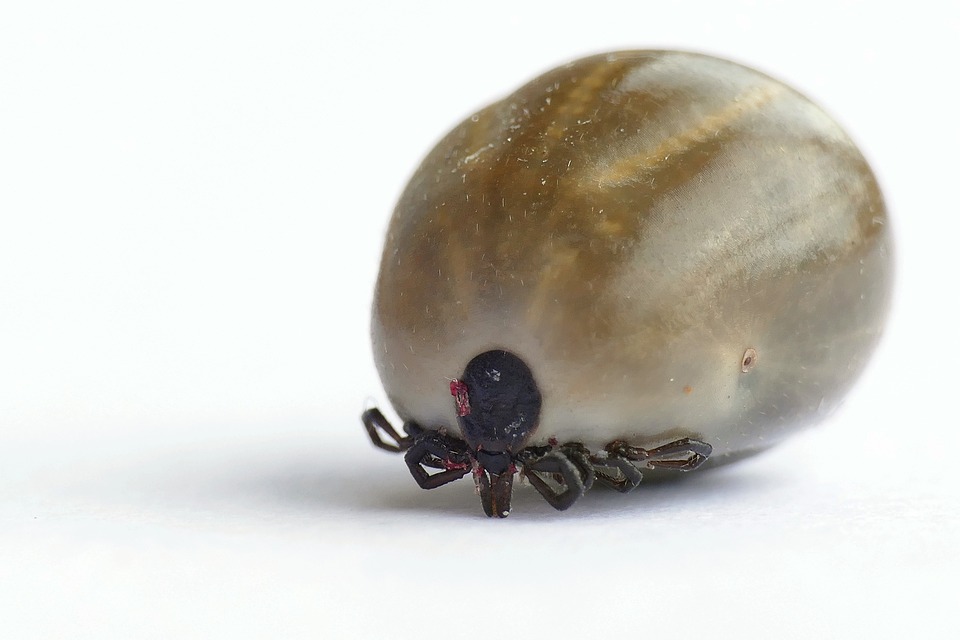Many individuals are unclear of the distinctions between these two types of pests.
Tick vs. bed bugs are both blood-sucking pests. They’re both found in places with high humidity, and they both tend to prefer dark, secluded places.

Here are many differences and some tips on how to identify them:
- Tick bites typically occur in a line or cluster; unlike bed bugs, bites usually appear randomly.
- Ticks, which often live in the woodpiles, attach themselves to their hosts for hours and feed on their blood, while bed bugs prefer hiding out in mattresses until you fall asleep and then bite you at night.
- Tick bite symptoms can include fever, chills, fatigue, and muscle aches. On the other hand, bed bug bites may cause redness or swelling at the bite site but are otherwise painless.
- When a tick bites humans (or find one still latched onto your body after it’s been removed), contact your doctor immediately for treatment advice. There is no specific treatment for bed bug bites, but they typically go away on their own within a week or two.
Bed bugs:

They are small, oval-shaped insects with four pairs of legs. Bed bugs prefer feeding on people’s blood. They live and hide in cracks and crevices near beds, wooded areas, and walls.
Bed bugs can be brown or reddish-brown when they have not been fed recently. After feeding, they turn dark red like an apple seed.
Bed bugs don’t carry diseases; these are symptoms of a bed bug bite humans ; redness, swelling, itching, and sometimes bruising.
Ticks:

They are small, eight-legs creatures. Ticks prefer feeding on animal blood and humans though in rare cases. Ticks are found in many outdoor places , including woods, forests, grassy areas, and yards with leaf litter or shrubs.
Ticks are smaller than a poppy seed when unfed and about the size of a sesame seed when engorged with blood.
Tick Bite Symptoms may include redness, swelling, rocky mountain spotted fever, warmth, numbness, tingling, or paralysis.
Prevention and Treatment of Bed Bugs:
- Remove clutter from your bedroom and vacuum it regularly.
- Check furniture for bed bugs before bringing it into your home.
- If you find bed bugs, call a pest control professional.
Prevention and Treatment of Ticks:
- Avoid areas where ticks are common.
- Check for ticks after being in a place where ticks are found.
- Remove any ticks that are seen as soon as possible.
- Consult a doctor after being bitten by a tick and develop any symptoms.
Can Ticks Be Found in Beds?
Yes; ticks can be found in beds. However, they are not typically there because they were already on your body when you went to bed or came into contact with an infected animal while sleeping.
Ticks prefer warm and moist environments such as leaf piles, tall grass, and shrubs. So, if you are generally careful about avoiding tick-infested areas, the chances of finding a tick in your bed are relatively low.
Ticks carry and transmit diseases such as Lyme disease to humans through their bites. Although rarer than other disease ticks like malaria or Zika virus infection, these illnesses are still dangerous so
How to Get Rid of Ticks?
You can remove a tick by handpicking with tweezers or another tool that is sharp enough not to crush its body but blunt enough so as not to damage your skin. Wash your hands after handling a tick.
Can Ticks Lay Eggs in the House?
Yes, ticks can lay eggs in the house. They may lay hundreds of eggs at a time. Suppose you find any evidence of tick life stages: egg, six-legged larva, eight-legged nymph, or adult. Make sure to destroy them properly.
Eggs are typically yellow or light brown, and they will be attached to a surface close to where the tick was feeding. Tick eggs can be tricky to spot, so it’s important to be vigilant if you’re concerned about them. Call a pest control professional for assistance if you find any eggs.
How Long Can a Tick Survive in the House?
Ticks can survive in the house for long periods, especially in warmer months, if not removed.
They can attach themselves to furniture, walls, and other surfaces. If a tick is left on a person for an extended period, it can cause health problems.
Does Bug spray work on Ticks?
There is some debate about whether bug spray works on ticks or not. Some people say that it does, while others claim it doesn’t.
There are many species repellents out there, and they all work differently.
So, if you’re looking for something to protect yourself from ticks, you should make sure it works against them before buying.
If your goal is to prevent tick bites in the first place, then yes, bug spray can be an effective way of doing so.
Just remember that these repellents aren’t perfect and won’t always work like magic 100% of the time, so you should still take other precautions as well.
For example, wearing protective clothing, i.e., long pants and sleeves, can help protect your skin from ticks, and checking yourself for ticks after being in an area where they may be present is also a good idea.
How Can I Tell If I Have Bed Bugs?
This is one of the most asked bed bugs questions. There are several ways to tell if you have bed bugs. One is that they leave behind tiny black dots on your sheets and pillowcases, which are their droppings.
They also tend to bite people in a line, often on the face or arms. If you’ve noticed any of these symptoms, it’s best to consult with a professional to determine if you have bed bugs and get help getting rid of them.
What Kills Bed Bugs Fast?
There are a few things that will kill bed bugs quickly. Some of these include high heat, freezing, and certain pesticides.
If you have a severe infestation, it is best to call a professional to help get rid of them. Bed bug bites are very itchy, so get rid of them as soon as possible.
How Long Do Bed Bugs Live?
Bed bugs live more than a year without feeding. On the other hand, Ticks can go for months without a blood meal. So which one is more resilient? Well, it depends on the environment.
In general, bed bugs can withstand cold and dry environments, while ticks prefer warm and humid climates. However, given favorable conditions, either one can survive for a long time.
Conclusion
Bed bugs and ticks may look similar, but they are very different. Bedbugs feed on their host blood while ticks will bite animals. Bed bugs do not spread diseases at first glance like ticks can, so it is important to know how to tell them apart before treating either problem in your home or business premises.


Leave a Reply